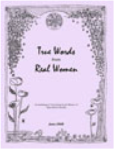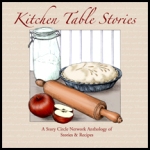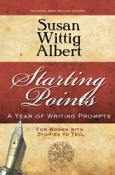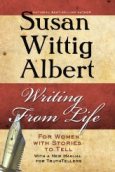The deal is: My father at 96 is a strong spirit in a weakening body. Sight, hearing, hands, heart, lungs…are all giving way. Yet, he carves, sings when it suits him, and…he writes. Here’s a recent conversation.
Photo: Erwin A. Thompson by Janet Riehl
P = Pop
J = Janet
Pop sits slumped over at the dining room table behind his computer desk.
J: You look like you’re in a Brown Study (http://www.wisegeek.com/what-is-a-brown-study.htm)
P: Very. I’ve finished Part Three of “March 1st” I’m at loose ends.
He’s been working on “March First” for a year; it’s about the day the mortgage payments came due during the Great Depression.
J: Grace Madison thinks there’s a Part Four.
P: Yes. Probably. But I don’t know what it is yet.
And so, I start to think. What can he write on while he’s waiting to know if there is a Part Four and what it is?
J: You pulled together all the letters, and poems, and stories about your brother Willard. And, we have stories about Uncle Ralph. What if you wrote more about your relationship with Ralph? Especially about how you worked together fixing things? You could start with the family story of “Between me and my brother I know everything in the world.” Then you can compile and expand on stories you’ve already written like how you fixed the furnace on a Sunday by making the part you needed.
P: Maybe, but I feel like I’ve already done that.
J: You have the individual pieces, but you can bring them together into one piece. The way you’ve done with some of your other family portraits like “A Woman Before Her Time” for your Aunt Mim. Or, what if you wrote about your brothers together? I haven’t seen you do that. It would be interesting to see them side by side.
P: Uhh.
J: Uhh.
This, in fact, is the one he goes for first. It takes about a week. It starts out, “It seems to me that I have written this all before, but Janet thought that I needed to put it all together in one place. I will try.” Last night he handed me what he had written and asked me what I thought.
J: It’s good. I learned things I didn’t know. As many years as I’ve heard and read these stories there continue to be little twists and new details that shine a whole new light on the point of the story and how it fits into the family story. But, I think you could do even more with this story of your two brothers.
P: Like what?
And so we talk about what that might be. Both Willard and Ralph were extremely talented and bright, but lacked opportunities and education due to family circumstances and the Great Depression. There are sad elements in both stories that feel too delicate to put in print. We agree, and talk about what can be comfortably said. My father’s motto is “Let history be kind.”
Now we’ll see which (if any) of my other suggestions he might take up.
1) My father was a pipe-fitter for the gas company. He uses pipe as a building material for a handrail up the back steps, lamps, mother’s African Violet tree.
J: This could be funny. It’s trendy now to use pipe in art. But, you’ve been doing it for decades. Write about pipe as a character.
- How did you meet it?
- Get to know it?
- Do with it?
2) The Dumbest Ideas I Ever Saw (This is one of his favorite phrases.)
This one hits pay dirt. He begins to tell me a long story which I take notes on. “It doesn’t suit me what I’m going to tell you. There is this thing called progress. Sometimes it isn’t. It started in 1931 when they put in the pipeline to our house. It was Virgin Soil. We never had a leak in our good galvanized pipe from corrosion.” And off he goes to tell me about what a dumb idea it was (in 1965 when he worked for Union Electric) to use anodes to heal up the holes already in the pipe.
3) History of guns on Evergreen Heights (our place) and in the family. For sport, protection, and farm use. Your Grandpa Riehl, Uncle Frank, you, and Gary.
That’s a pass. We talk about it briefly.
4) “Line Out”
J: Daddy, what’s the origin of the phrase “line out” that we use to mean get organized to work?
P: (thinks) It must be related to the nursery business. (Evergreen Heights was an innovative working horticultural business.)
5) You’ve put together photo-documentation books and extensively documented E. A. Riehl’s horticultural work here on the place. But, what if you looked at that in an even bigger context? (I draw concentric circles.)
- Life of the family
- Neighborhood
- Community
- State Nut Growers Society
- National horticultural world
What about an essay that draws all this together?
And so it goes. Now? Time to take the clothes out of the drier and put some food on the table.
_______________
Pose questions about practical creativity; give ideas for future cycle themes; and join in the dialog. Learn more about our audio book “Sightlines: A Family Love Story in Poetry and Music.” Become a Riehlife villager.







Janet, You are amazing! Your ability to draw out your dad’s stories is just a beautiful gift–to you, your family, the world, and especially to your dad. He’s lucky to have you!
Janet’s simple yet powerful narrative informs us that helping others is not a detour, it’s the destination, it’s payback onto cleansing karma.
After reading Janet’s post, I was reminded of this apt quote:
Zorba came upon an old man planting an apricot
seedling and asked why he, an old man, was
planting a new tree.
‘I live life as though I would never die,’ was his
reply.
‘And me, I live as though I might die tomorrow,’
said Zorba, ‘which one of us is right?’
Nikos Kazantzakis,
Zorba the Greek
Susan,
Creative nurturing as caretaking is something that’s rarely considered or discussed. I feel that it’s caring at a soul level. For my father, my Creative Catalyst work is designed to sustain his life force–his will to live. Each of us–whether artistically creative or not–needs nurturing on this level. I reckon we’re all lucky to have each other. I’ve always been my father’s muse. I’m not sure why. Maybe it’s the younger daughter thing.
Often in memoir work about caring for a parent or loved one who’s dying there’s a focus on the deathbed scene–the last few days or weeks. Your work with Richard–caring, creative legacy, sharing with your writing–showed your readers this bigger picture.
I’m so touched by your comment. You are an inspiration to many, and I’m glad my work also does your heart good. I’m awed by all the work you’re doing to enter this next stage in your life. You Go Girl.
Janet
Eden,
Hmmm… Both?
The apricot tree has to be planted before the fruit can be enjoyed. Perhaps if we “live life as though [we] would never die,” then we also life as though we might die tomorrow.
What do you think?
Our exchange about taking care of our parents in their last years has been a strong support for me over the years. Thank you.
Janet
Yes. Janet. Both. I agree.
Your stepping up as Pop’s caregiver is onto sacred ground for you both.
Janet, I’m so impressed by what a gift you are to each other, and how lucky you are to have a father who shares your love of writing and is willing to allow you to be part of his creative process. The reverse is true, too! Thank you for sharing this heartwarming vignette.
Amber, thank you. He’s a man who always worked with his hands and, very simply, made music-carvings-poems-novels… I like the matter-of-factness of how he’s led his creative life.